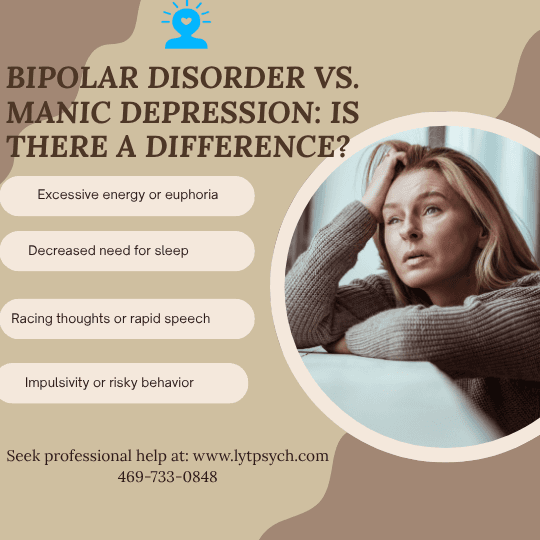Thu Jun 05 2025
Bipolar Disorder vs. Manic Depression: Is There a Difference? at Lyte Psychiatry (Best Adults and Adolescents Therapist and Psychiatrist Near You, Affordable Therapist and Psychiatrist Near You) Dallas & Arlington, TX.

Bipolar Disorder vs. Manic Depression: Is There a Difference?
at Lyte Psychiatry (Best Adults and Adolescents Therapist and Psychiatrist Near You — Affordable Therapist and Psychiatrist Near You | Dallas & Arlington, TX)
Manic Depression vs. Bipolar Disorder
📘 Today, “manic depression” is considered outdated in clinical settings, but many still use it colloquially—especially in older generations or pop culture.
What Exactly Is Bipolar Disorder?
Common Symptoms to Watch For
Mania or Hypomania:
🔷 Excessive energy or euphoria
🔷 Decreased need for sleep
🔷 Racing thoughts or rapid speech
🔷 Impulsivity or risky behavior
🔷 Grandiose thinking or inflated self-esteem
Depression:
🔷 Low energy, fatigue, or difficulty concentrating
🔷 Feelings of hopelessness or worthlessness
🔷 Changes in appetite or sleep
🔷 Loss of interest in usual activities
🔷 Thoughts of self-harm or suicide
Is It Just Mood Swings?
No. Unlike regular ups and downs, bipolar disorder involves long-lasting and intense episodes that disrupt your ability to function at work, school, or in relationships. It’s a medical condition—not a personality trait or emotional weakness.
Why Proper Diagnosis Matters
You’re Not Alone. And This Doesn’t Define You- Schedule an Appointment at Lyte Psychiatry (Affordable Therapist and Psychiatrist Near You)
To schedule an appointment. Click Here
To see our services. Click Here
Call us if you have questions at 469-733-0848
Frequently Asked Questions:
Q: Is bipolar disorder curable?
A: It’s a lifelong condition, but with treatment, many people manage symptoms and live full, stable lives.
Q: Can teens have bipolar disorder?
A: Yes. Symptoms often appear in late adolescence or early adulthood. Early diagnosis leads to better outcomes.
Q: Do I need to be on medication forever?
A: Not always. Treatment plans are flexible and evolve over time. The goal is symptom stability and improved quality of life.
Q: What if I was told I only have depression?
A: Bipolar disorder is often misdiagnosed. If traditional depression treatment hasn’t worked, a re-evaluation may help clarify what’s really going on.